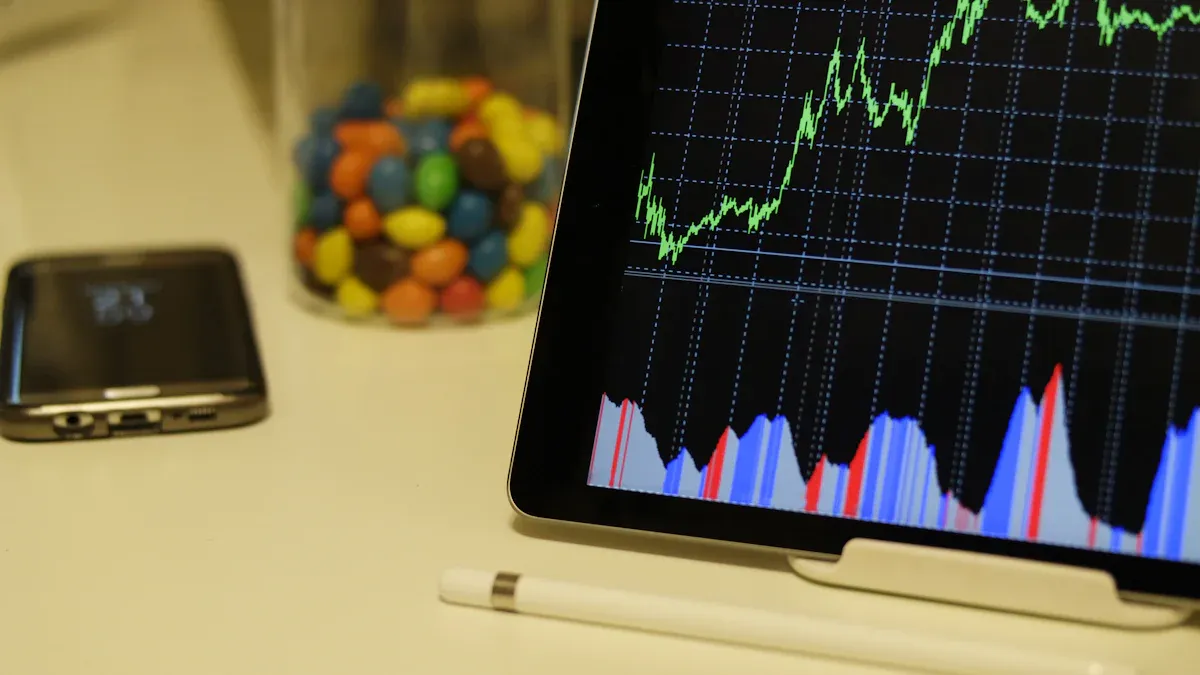- EasyCard
- Trade
- Help
- Announcement
- Academy
- SWIFT Code
- Iban Number
- Referral
- Customer Service
- Blog
- Creator
Is the OTC Market Suitable for Ordinary Investors? Are There More Risks or Opportunities?

Image Source: unsplash
When you consider entering the OTC market, you need to focus on the completeness of information disclosure. The OTC market is suitable for investors, especially if you are skilled at independent analysis and can tolerate higher risks. You will find that there are more opportunities here, but transparency is lower, and risk management requirements are high. You need to assess your risk tolerance and understand the market characteristics before making a decision.
Key Highlights
- The OTC market provides diverse investment options, suitable for investors seeking to try different asset classes.
- Investors need independent analysis skills and proactive information gathering to reduce risks, especially in cases of insufficient information disclosure.
- The OTC market has a low entry threshold, suitable for investors with limited capital, but it also comes with higher risks.
- Insufficient liquidity may lead to trading delays, so investors should pay attention to asset liquidity to avoid losses.
- In OTC market investments, reasonable risk management and clear investment goals are key to success.
Market Characteristics
Trading Methods
When you trade in the OTC market, you typically do not enter a centralized, standardized venue like in exchange markets. The OTC market uses a non-centralized trading method, where buyers and sellers complete transactions through brokers or direct negotiation. You can find that this method provides more financing and trading opportunities for emerging industries and small and medium-sized enterprises. In the U.S. market, many startups and growth-stage companies choose to list on the OTC market because they do not meet the strict listing requirements of exchanges. In the OTC market, you can access a wider variety of securities, including bonds, derivatives, and unlisted stocks.
You need to note that the trading objects in the OTC market are diverse, including large enterprises and small and medium-sized enterprises. The trading method is flexible, but the degree of standardization is lower, making it prone to price differences and information asymmetry.
Information Disclosure
The information disclosure requirements in the OTC market differ significantly from those in regulated exchange markets. When you invest in the OTC market, the information you obtain may not be as comprehensive as in exchange markets. The table below shows a comparison of information disclosure requirements between the two:
| OTC Market Information Disclosure Requirements | Regulated Exchange Market Information Disclosure Requirements |
|---|---|
| New OTCID requires companies to make quarterly and annual disclosures | Typically requires stricter financial reporting and transparency |
| Companies must provide management certifications and company profile updates | May have higher compliance standards |
| Companies not meeting requirements will be downgraded to Pink Limited or Expert Market | Regulated markets typically do not allow such downgrades |
When you invest in the OTC market, you must proactively obtain and analyze company information. Some companies have insufficient information disclosure, which may affect your judgment. In contrast, exchange markets have higher information disclosure requirements, making it easier for investors to access transparent and timely data.
Entry Threshold
The entry threshold for the OTC market is relatively low. Many securities can be traded without requiring large amounts of capital, suitable for you with limited funds but hoping for diversified investments. Some OTC markets have low investor qualification requirements, allowing ordinary investors to participate. However, the low threshold also means you need to bear higher risks. With less regulation and lower transparency, investors need independent analysis and risk identification capabilities.
| Aspect | OTC Market | Traditional Exchange Market |
|---|---|---|
| Regulatory Level | Less regulated, lower transparency | Strictly regulated, high transparency |
| Trading Venue | Non-centralized trading, lacking standardization | Centralized trading, high standardization |
| Counterparty Risk | Higher risk, lacking protection | Lower risk, usually with clearinghouse involvement |
When judging whether the OTC market is suitable for investors, you need to combine your own risk tolerance and information acquisition ability. The OTC market provides more choices and flexibility for you, but it also requires stronger risk management awareness.
Main Risks

Image Source: pexels
Transparency
When you invest in the OTC market, you will find that information transparency is far lower than in regulated exchange markets. Many companies disclose only limited financial and operational data. It is difficult for you to obtain timely and complete information, increasing the difficulty of investment decisions. Information asymmetry is prevalent, and some companies even update information only quarterly or annually. You need to spend more time proactively searching and analyzing data. Market prices fluctuate significantly and are easily influenced by news. When judging whether the OTC market is suitable for investors, you must consider the risks brought by insufficient information disclosure.
Liquidity
When you trade in the OTC market, you often encounter liquidity issues. Liquidity problems frequently occur in low-rated assets during market stress periods. The table below shows the related situation:
| Evidence Type | Description |
|---|---|
| Frequency of Liquidity Issues | Liquidity problems frequently occur in low-rated assets during stress periods in the OTC market. |
| Transaction Completion Time | The original text does not provide specific transaction completion times, but mentions that the frequency and cost of failed transactions affect liquidity. |
You may need to wait longer to complete transactions or even face the risk of transaction failure. Poor liquidity leads to wider bid-ask spreads, affecting your investment returns. When managing funds, you need to pay special attention to liquidity risks to avoid losses due to inability to liquidate in time.
Legal Compliance
When you invest in the OTC market, you must face multiple legal and compliance challenges. Common issues include:
- Regulatory Scrutiny: You need to undergo scrutiny from regulatory bodies such as the SEC and OTC Markets Group.
- Anti-Money Laundering Compliance: You must follow strict anti-money laundering procedures to prevent legal risks.
- Insider Trading Laws: You need to establish compliance processes to avoid legal consequences from insider trading.
- Cross-Border Transaction Complexity: When engaging in cross-border transactions, you need to understand regulatory requirements in different countries.
In actual operations, you may face legal litigation or penalties due to incomplete compliance processes. You need to continuously monitor policy changes and adjust investment strategies in a timely manner. Legal risks and compliance costs directly affect your investment safety.
When investing in the OTC market, all risks are borne by you. You need independent analysis skills and risk management awareness to make rational choices between opportunities and risks.
Investment Opportunities

Image Source: pexels
Diversification Choices
In the OTC market, you can access a rich variety of investment products. Compared to traditional exchanges, the OTC market provides more diverse financial instruments for you. For example, you can choose American Depositary Receipts (ADRs) and foreign ordinary shares. In addition, the OTC market also covers stocks, private bonds, derivatives, currencies, and commodities. You have the opportunity to invest in small emerging companies that are not listed, as they typically cannot list on mainstream exchanges. The OTC market is also renowned for its wide variety of securities, including OTC derivatives, foreign stocks, and penny stocks. Many startups and shell companies also choose to trade here. You can flexibly allocate assets based on your risk preference and investment goals.
Investment Threshold
The threshold for entering the OTC market is low. Many U.S. brokerage accounts have no minimum deposit requirements. The table below shows the minimum deposit standards for some accounts:
| Account Type | Minimum Deposit Requirement |
|---|---|
| Schwab One® Account | $0 |
| Schwab IRA | $0 |
| Schwab One® International Account | $0 |
You can participate in diversified investments with smaller amounts of capital without bearing high initial costs. This characteristic makes the OTC market suitable for investors, especially those hoping to try different asset classes with lower capital thresholds.
Flexibility
The OTC market brings higher trading flexibility for you. You are not restricted by traditional exchange rules and can negotiate prices, volumes, and expiration dates directly with trading counterparts. You can also choose more professional derivatives or rare stocks not listed on exchanges. Flexible trading terms allow you to customize investment plans based on your needs. You can seize market changes and adjust investment strategies in a timely manner, improving capital utilization efficiency.
Analysis of OTC Market Suitability for Investors
Suitable Groups
When considering whether the OTC market is suitable for investors, you need to understand which groups are more likely to succeed in this market. The OTC market provides customized trading and higher privacy protection for you. If you have the following characteristics, your opportunities in the OTC market are greater:
- Older age, with more investment experience and market awareness.
- Greater wealth, allowing you to tolerate higher risks and diversify your portfolio.
- Rich investment experience, enabling you to independently analyze information and identify potential opportunities and risks.
- Diversified investment portfolio, skilled at allocating different types of assets to reduce the impact of fluctuations in a single market.
If you seek trading flexibility or hope to participate in the growth opportunities of emerging industries and small and medium-sized enterprises, the characteristics of the OTC market suitable for investors align closely with you. You can also customize trading terms based on your needs to protect personal privacy and avoid excessive exposure.
When investing in the OTC market, proactive information acquisition and independent judgment skills are very important. You need to continuously learn market rules and enhance risk identification capabilities.
Weighing Pros and Cons
When judging whether the OTC market is suitable for investors, you must weigh the risks and opportunities of the market. The OTC market brings diverse choices and flexible trading for you, but it also comes with challenges like information opacity and insufficient liquidity. You can refer to the following strategies to balance risks and returns:
- Market Selection: You can prioritize higher-supervision and transparency market levels like OTCQX to reduce information asymmetry risks.
- Risk Management: You can set stop-loss orders, diversify your portfolio, stay attentive to market trends, and adjust investment strategies in a timely manner.
- Due Diligence: You need to thoroughly evaluate a company’s financial condition, management team background, and industry competitiveness to avoid blind investments.
In actual operations, combine your own financial strength, investment experience, and risk tolerance to formulate reasonable investment plans. If you pursue high returns and are willing to bear higher risks, the OTC market suitable for investors offers more opportunities. If you prefer stable investments, it is recommended to prioritize markets with more complete information disclosure.
When weighing pros and cons, maintain rationality and avoid impulsive decisions due to market fluctuations or news influences. You can regularly review investment strategies to enhance risk prevention capabilities.
Suggestions for OTC Market Suitability for Investors
Information Acquisition
When investing in the OTC market, your information acquisition ability determines the quality of your decisions. You can improve data reliability through the following methods:
- Pay attention to whether the issuer regularly discloses financial and operational information. You should prioritize companies with standardized information disclosure.
- Check if the stock transfer agent regularly reports share data. This helps you verify the timeliness and accuracy of the data.
- Understand the role of regulatory bodies (such as U.S. FINRA) in the market. You can use announcements and reports published by these institutions to assist in judging the compliance and transparency of investment targets.
Proactively collecting and analyzing information can reduce risks from information asymmetry. Before investing, verify data from multiple channels to enhance the scientific rigor of decisions.
Risk Prevention
Risk prevention measures are crucial when you invest in the OTC market. Refer to the following suggestions:
- Conduct fundamental research to understand the company’s financial condition, management team, and product pipeline. You can obtain relevant information through public materials and industry reports.
- Assess liquidity by focusing on daily trading volume and bid-ask spreads. You should choose assets with better liquidity to reduce the probability of transaction failures.
- Clearly set profit targets and maximum acceptable losses. Maintaining trading discipline and avoiding emotional influences in decisions helps control risks.
In actual operations, combine your own experience and financial strength to formulate reasonable investment plans. The OTC market is suitable for investors, but you must continuously enhance risk identification and management capabilities to achieve stable returns in complex environments.
When considering whether the OTC market is suitable for investors, you need to clearly understand the market’s diversity and flexibility. You can directly participate in trading various financial instruments, including stocks, bonds, and derivatives. You should note that the OTC market has risks like insufficient information disclosure, poor liquidity, and fraud risks. Common mistakes include overestimating returns, ignoring high transaction costs, and low transparency. New regulations have improved transparency in some markets, but you still need to assess your own risk tolerance and investment goals.
Understand the pros and cons of the OTC market and avoid blind following to rationally determine if it suits you.
| Main Risks | Main Opportunities |
|---|---|
| Information Asymmetry, Fraud | Diversified Choices, Flexibility |
| High Transaction Costs | Low Entry Threshold |
FAQ
What is the biggest difference between the OTC market and exchange markets?
When you trade in the OTC market, you face a non-centralized, non-standardized venue. In exchange markets, you enjoy higher transparency and regulation.
Can I participate in the OTC market with small amounts of capital?
You can. U.S. brokerage accounts typically have no minimum deposit requirements. You can buy and sell OTC securities with smaller amounts of capital.
Is the liquidity risk in the OTC market high?
You often encounter insufficient liquidity in the OTC market. You may need to wait longer to complete transactions, and bid-ask spreads will also be wider.
What are some common investment products in the OTC market?
You can invest in American Depositary Receipts, foreign ordinary shares, bonds, derivatives, and unlisted stocks. You can choose different products based on your needs.
How do I obtain reliable information when investing in the OTC market?
You should pay attention to the financial and operational data regularly disclosed by companies. You can also check announcements and reports published by U.S. regulatory bodies to assist in judgment.
Having explored the OTC market’s opportunities and risks like diverse assets versus low transparency and liquidity, you’re ready to weigh its fit, but high cross-border fees, currency volatility, and offshore account complexities can hinder seizing emerging firms or derivatives, especially for rapid trades. Picture a platform with 0.5% remittance fees, same-day global transfers, and zero-fee contract limit orders, enabling seamless OTC access via one account?
BiyaPay is crafted for flexible investors, offering instant fiat-to-digital conversions to act on OTC dynamics swiftly. With real-time exchange rate query, track USD shifts and remit at optimal moments to cut costs. Covering most regions with instant arrivals, it powers quick plays in low-threshold assets like ADRs or penny stocks. Standout: trade U.S., Hong Kong, and OTC markets through a single account, leveraging zero-fee contract limit orders for diverse strategies.
Whether chasing startup potential or diversifying portfolios, BiyaPay fuels your moves. Sign up now, visit stocks for U.S. and OTC prospects—quick setup unlocks cost-effective, agile investing. Join global traders and turn OTC risks into rewards!
*This article is provided for general information purposes and does not constitute legal, tax or other professional advice from BiyaPay or its subsidiaries and its affiliates, and it is not intended as a substitute for obtaining advice from a financial advisor or any other professional.
We make no representations, warranties or warranties, express or implied, as to the accuracy, completeness or timeliness of the contents of this publication.




Contact Us
Company and Team
BiyaPay Products
Customer Services
is a broker-dealer registered with the U.S. Securities and Exchange Commission (SEC) (No.: 802-127417), member of the Financial Industry Regulatory Authority (FINRA) (CRD: 325027), member of the Securities Investor Protection Corporation (SIPC), and regulated by FINRA and SEC.
registered with the US Financial Crimes Enforcement Network (FinCEN), as a Money Services Business (MSB), registration number: 31000218637349, and regulated by FinCEN.
registered as Financial Service Provider (FSP number: FSP1007221) in New Zealand, and is a member of the Financial Dispute Resolution Scheme, a New Zealand independent dispute resolution service provider.




















